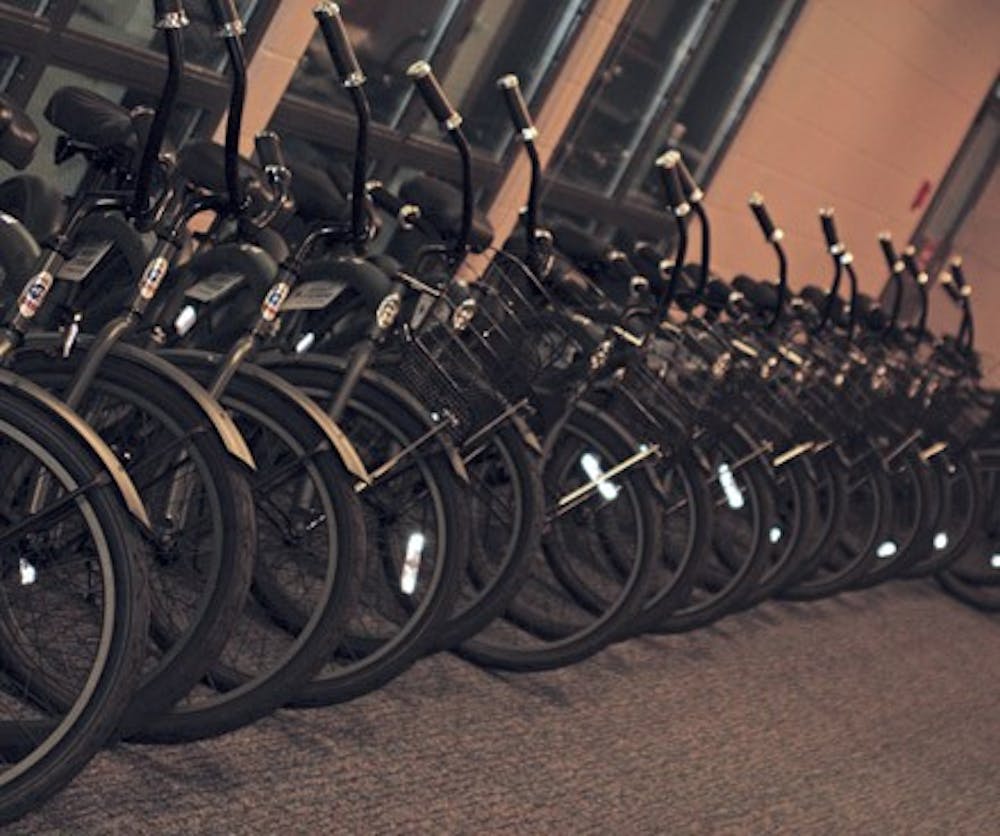The University of Richmond will introduce its newest environmental initiative this afternoon, and this time students will be asked to give up their cars instead of their dining hall trays.
"The ultimate goal is for people to start riding bikes instead of driving around," said senior Karen DeBonis, one of the students behind the university's new bike-sharing program, which will allow students to ride university-owned bikes anywhere on campus.
The bikes, 35 army-green beach cruisers with front baskets and fenders to prevent splash-ups, will debut on campus during a campus-wide scavenger hunt this afternoon.
The bikes will be available for students to ride any time, but they may not be locked up, brought inside of apartments or residence halls or ridden off campus.
DeBonis got the idea for a bike-sharing program at Virginia Power Shift 2008, an environmental conference held last October at Virginia Tech University. DeBonis, who attended the conference as a member of RENEW/Sierra Club -- now known as GreenUR -- recruited senior Brendan Judy, junior Julie Stevenson and junior Amy Newsock - currently studying abroad in Geneva, Switzerland - to help create a program at Richmond.
Bike sharing is popular in foreign cities such as Paris, Barcelona and Montreal. An Aug. 13, New York Times article reported that U.S. cities such as Washington, Boston and New York could soon implement bike sharing programs. Bike sharing is also popular on other college campuses. At the University of New England, handing out bikes during the first week of school reduced the number of first-year students with cars on campus from 75 percent in 2007 to just 25 percent in 2008.
DeBonis, who bikes half an hour to campus each day, and Judy, president of Richmond's triathlon club, each have their own bikes, but Stevenson said she would use the bike-sharing program. Stevenson had a bike during her freshman year that was stolen, she said. During her sophomore year, Stevenson left her bike outside of the Tyler Haynes Commons and the back wheel was misshapen so badly that it would have cost less to replace the bike than repair it.
"I'm excited for the program," Stevenson said, "because my parents are at their quota for buying me bikes."
In order to avoid similar theft of and damage to the shared bikes, the organizers were planning to rely on the honor code, Stevenson said, and were hoping they would find all 35 bikes when they collect them to be serviced by the Facilities Department and GreenUR volunteers each month.
"It's a program for students," Stevenson said, "so I don't want to say there's a punishment. But if the bikes end up broken or in the lake, there's no incentive to buy more."
In order to encourage students to take more responsibility for the bikes, the group had discussed allowing student organizations to sponsor a bike by repainting it, Stevenson said.
"It would give people more ownership over the bikes," Stevenson said. "I hope it would make them more likely to pick it up if they see it lying on the ground."
Enjoy what you're reading?
Signup for our newsletter
The program currently includes just 35 bikes, which were purchased for $200 each, said Tom Roberts, director of recreation and wellness, using a fund generated by donations from alumni. The students said they had hoped the program would expand in the future, and Judy said it could one day boast as many as 120 bikes. They also hope to someday add an off-campus component to the bike-sharing program and to create bike lanes on campus roads.
Stephen Long, a political science professor who bikes 18 miles round-trip from his home in Short Pump to campus each day, said in order to make the program a success, the university would need to become more bike-friendly.
"Having bicycles available on campus is a great start," Long said, "but without a useful network of bicycle paths and trails, those bicycles might not be widely used. To become truly bicycle-friendly, the university should consider creating bicycle lanes on the interior campus roads and bicycle paths along the side of College Road, Campus Drive and other roads bordering campus."
Richmond's program will begin this afternoon with a kick-off event in the Forum. President Edward L. Ayers, who signed the American College and University Presidents Climate Commitment in 2007, will speak, as will DeBonis, Stevenson, Judy and a member of the university's sustainability committee.
Then, students are invited to participate in a campus-wide scavenger hunt for bikes. The scavenger hunt, a Department of Recreation and Wellness Natural High program, will be followed by pizza for participants. All 35 of the shared bikes have been reserved for the event, but students with their own bikes are invited to participate.
"Just show up," DeBonis said. "I can't wait for the green ribbon to be cut and the bikes released. Everyone should see it."
Contact staff writer Emily Baltz at emily.baltz@richmond.edu
Support independent student media
You can make a tax-deductible donation by clicking the button below, which takes you to our secure PayPal account. The page is set up to receive contributions in whatever amount you designate. We look forward to using the money we raise to further our mission of providing honest and accurate information to students, faculty, staff, alumni and others in the general public.
Donate Now



